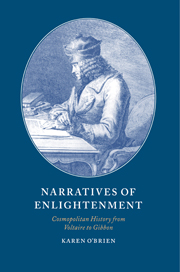Book contents
- Frontmatter
- Contents
- Acknowledgements and author's
- 1 Introduction: cosmopolitanism, narrative, history
- 2 Voltaire's neoclassical poetics of history
- 3 European contexts in Hume's History of England
- 4 William Robertson to the rescue of Scottish history
- 5 Robertson on the triumph of Europe and its empires
- 6 Emulation and revival: Gibbon's Decline and Fall of the Roman Empire
- 7 David Ramsay's sceptical history of the American Revolution
- Afterword
- Bibliography
- Index
- CAMBRIDGE STUDIES IN EIGHTEENTH-CENTURY ENGLISH LITERATURE AND THOUGHT
3 - European contexts in Hume's History of England
Published online by Cambridge University Press: 28 October 2009
- Frontmatter
- Contents
- Acknowledgements and author's
- 1 Introduction: cosmopolitanism, narrative, history
- 2 Voltaire's neoclassical poetics of history
- 3 European contexts in Hume's History of England
- 4 William Robertson to the rescue of Scottish history
- 5 Robertson on the triumph of Europe and its empires
- 6 Emulation and revival: Gibbon's Decline and Fall of the Roman Empire
- 7 David Ramsay's sceptical history of the American Revolution
- Afterword
- Bibliography
- Index
- CAMBRIDGE STUDIES IN EIGHTEENTH-CENTURY ENGLISH LITERATURE AND THOUGHT
Summary
David Hume's History of England (1754–62) earned him rapid and unwelcome recognition as the Voltaire of British history, not least from Voltaire himself who found the work as philosophical, rational and cosmopolitan as his own. Commentators as astute as Horace Walpole and Samuel Johnson thought that Hume had tried to imitate Voltaire, although Hume denied it, rightly feeling that his work presented British readers with a new kind of national history, at once more sophisticated and more uncomfortable than anything to be found in the Siècle de Louis XIV. Modern critics have tended to confirm Hume's estimation of his own achievement as the first philosophically independent history of the Enlightenment age. They have, however, tended to praise the History's analysis of the changing historical fortunes of the British constitution and British politics at the expense of the cosmopolitan dimension celebrated by Voltaire. For Hume's History of England seemed to his contemporaries to speak to a European audience on European themes, and to provide a historiographical model for other national narratives. The History, which covers the period from the invasion of Julius Caesar to the accession of William III, was written (like a witch's spell, quipped one reviewer) in reverse order: the two volumes on the seventeenth century appeared (as a kind of Siècle des Stuart) in 1754 and 1756, the two on the Tudor period in 1759, and the medieval and premedieval pair in 1761.
- Type
- Chapter
- Information
- Narratives of EnlightenmentCosmopolitan History from Voltaire to Gibbon, pp. 56 - 92Publisher: Cambridge University PressPrint publication year: 1997



